Undergraduate students of kinesiology from universities across Canada converged on the University of Toronto Faculty of Kinesiology and Physical Education (KPE) last week for the 24th annual Bertha Rosenstadt national undergraduate research conference.
The multidisciplinary conference offers undergraduate students the opportunity to present literature reviews, critiques, term papers and findings from research projects covering a range of topics, including exercise physiology, biomechanics, sports medicine, coach education, motor learning and control, exercise and sport psychology, philosophy, history and sociology of sport.
“We know that movement – whether through physical activity, sport, dance or play – is central to the health and well-being of individuals, communities and society at large,” said Professor Gretchen Kerr, dean of KPE, in her welcoming address. “Your research projects not only add to the body of knowledge in the field of kinesiology, they have the ability to inspire others to rethink their perceptions, change their practices and develop solutions with real-world impact.”
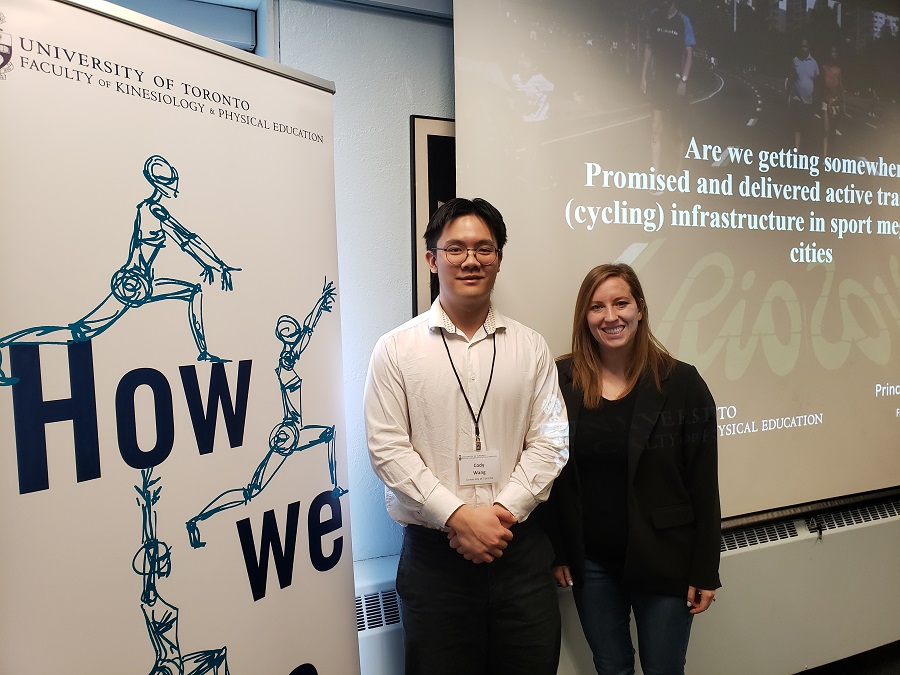
Fourth year KPE student Cody Wang poses with his faculty advisor, Assistant Professor Madeleine Orr
Cody Wang, a fourth-year student at KPE, presented his research on the promised and delivered active transportation infrastructure in sport mega-event host cities, with a special focus on cycling. He shared that there was little to no scholarly literature on the topic, something he found surprising.
“I was a little more optimistic going into it,” said Wang, whose faculty advisor was Assistant Professor Madeleine Orr, a sport ecologist. “I thought there would be more discourse around active transportation and cycling infrastructure in mega events, but unfortunately that’s not the case … at least not yet.”
Wang gave the example of Paris, which has been making some improvements to its infrastructure ahead of the Summer Olympic Games, as a sign of hope that other cities might follow suit, but said more research is needed to understand why it hasn’t happened already.
“If we can have infrastructure that supports safe cycling for everyone - men, women, the elderly and children - we would not only be supporting a healthy lifestyle, but also contributing to alleviating the impact of climate change,” said Wang, who will be going to the University of British Columbia community and regional planning program for his master's studies. “I hope to continue doing the research I started at KPE there.”
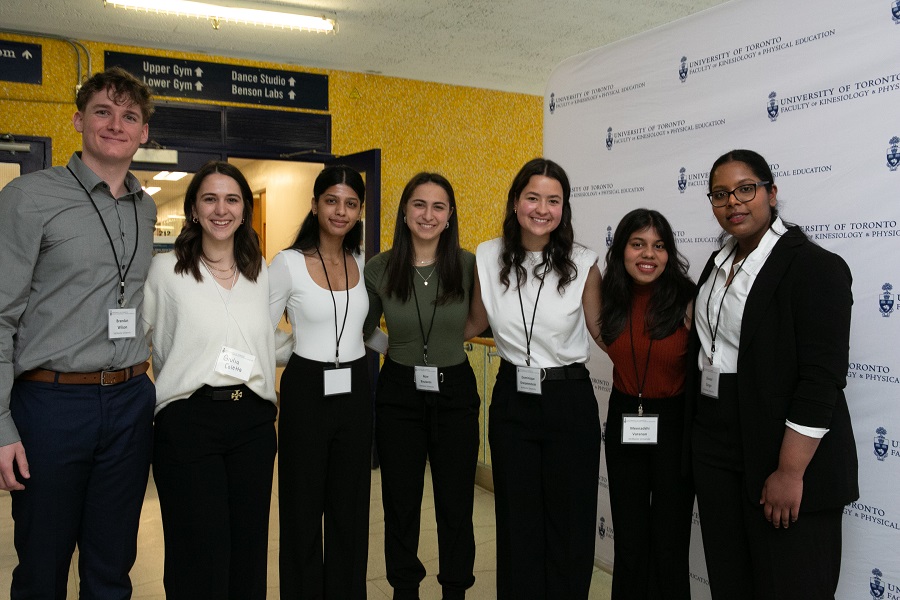
Brandan Wilson, left, was among the strong contingent of kinesiology students from McMaster University who presented at the conference
Brandan Wilson, in his fourth year at McMaster University, presented his undergraduate thesis on the effects of the menstrual cycle phase on countermovement jump performance. The countermovement jump is a vertical jump test used to measure lower body power. It’s performed by having an athlete quickly squat and then jump as high as possible.
“My key finding has been that menstrual cycle phase does not seem to impact acute performance on the countermovement jump task,” said Wilson, whose faculty advisor is Professor Stuart M. Phillips. “This is important because there’s a lot of different information going around about how the menstrual cycle phases and the hormones associated with them impact performance, so having a study that shows that, on a base level, the fluctuations of hormones don’t seem to impact performance could be a big relief for athletes and non-athletes.”
However, Wilson adds that different forms of performance testing still need to be done and menstrual cycle validated questionnaires need to be created because while the fluctuations of hormones don’t seem to impact performance on their own, symptoms and feeling state (the link between feeling and behaviour) might. 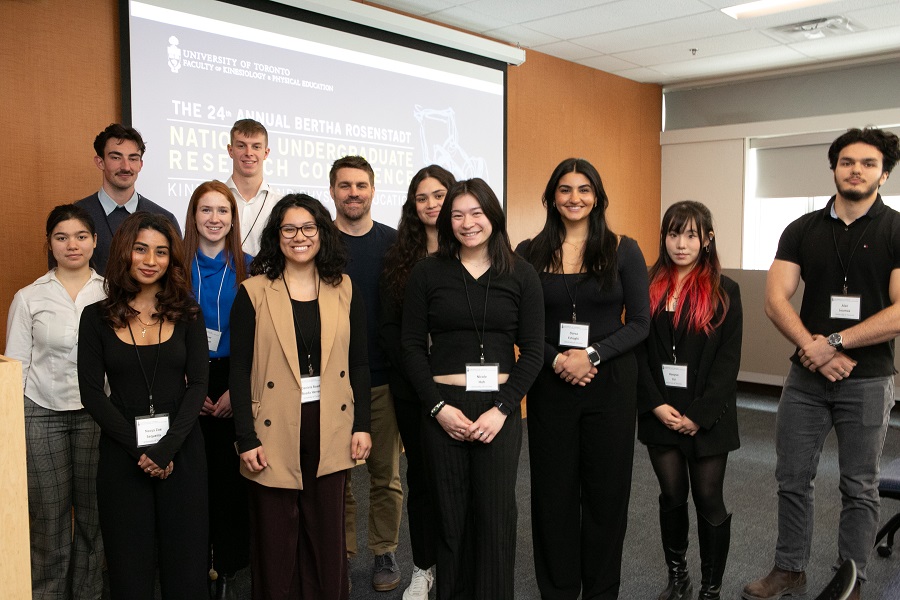
Alex Isidori, top left, was one of a large group of KPE students advised by Assistant Professor Tim Burkhart, centre, to present his research at the conference
For his research project, fourth year KPE student Alex Isidori looked into how different exercises stimulate the muscles in the rehab phase following an ACL surgery, so that they don’t decrease in size.
“At the moment, there are two camps - some people prefer to use open chain exercises, like leg extensions or leg lifts, and others prefer to use closed chain exercises, like squats,” said Isidori, one of ten students from Assistant Professor's Timothy Burkhart's lab to present his research at the conference. “The idea is that open chain exercise will stimulate the muscle more.”
However, Isidori’s research found that no load in the squatting condition produced just as good, if not better stimulation of muscles as did open chain exercises. Another key finding was that increasing the load past ten per cent of the body weight in open chain exercises, didn’t necessarily increase the stimulation of the muscle. The third finding was that unilateral or single leg close chain exercise did not increase stimulation the same way bilateral or two leg exercise did.
“The importance of this study is to show that the choice and impact of the exercises really depend on the practitioner and the rate of progress of the individual,” said Isidori. “Things should be put into context, they’re not black and white.”
"It is such a pleasure for me to see these students presenting this work, especially since for some of them it is their first experience with research and their first experience presenting at a conference," said Burkhart after watching his students share their work. "It also makes me happy that there seems to be such an interest in biomechanics research.
"This is truly a team effort as many of the projects were supervised by my graduate students, Meg Harrington, Pratham Singh, Tiffany Tiu and Anita Borhani. I really couldn't have supervised that many students without them."
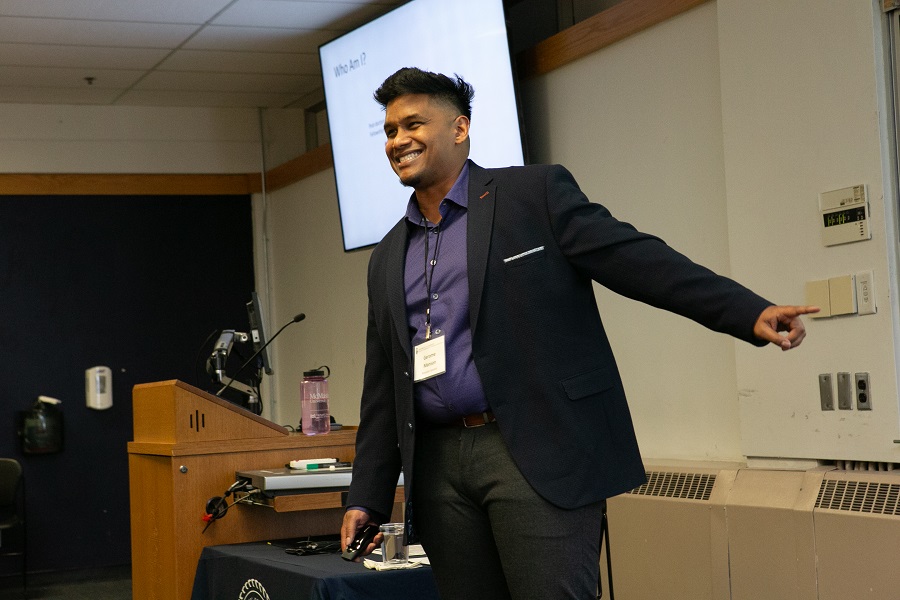
Gerome Manson, a KPE alumnus and principal investigator at Queen's University Sensorimotor Exploration lab, delivered the keynote address
Gerome Manson, a KPE alumnus, who currently serves as the principal investigator at Queen’s University’s Sensorimotor Exploration Lab, delivered the keynote address in which he explored the planning and online control of movements to the body.
The conference concluded with the announcement of the three best presentations awards, selected by a popular vote, presented by Associate Professor Catherina Amara, associate dean of undergraduate education at KPE:
- The influence of sport type, fitness level and concussion history on spatial abilities and executive functions, presented by Adrienne Lee from McMaster University (faculty advisor: Associate Professor Jennifer Heisz)
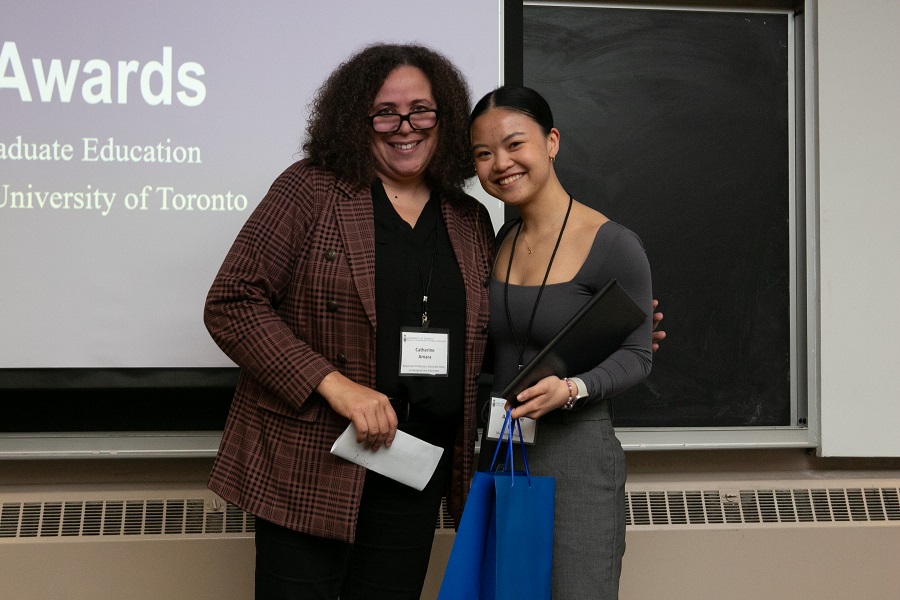
- Rate of fat oxidation in recovery from high-intensity interval exercise is influenced by the nutritional composition of post-exercise snacks, presented by Erica Petrucci of KPE (faculty advisor: Assistant Professor Jenna Gillen)
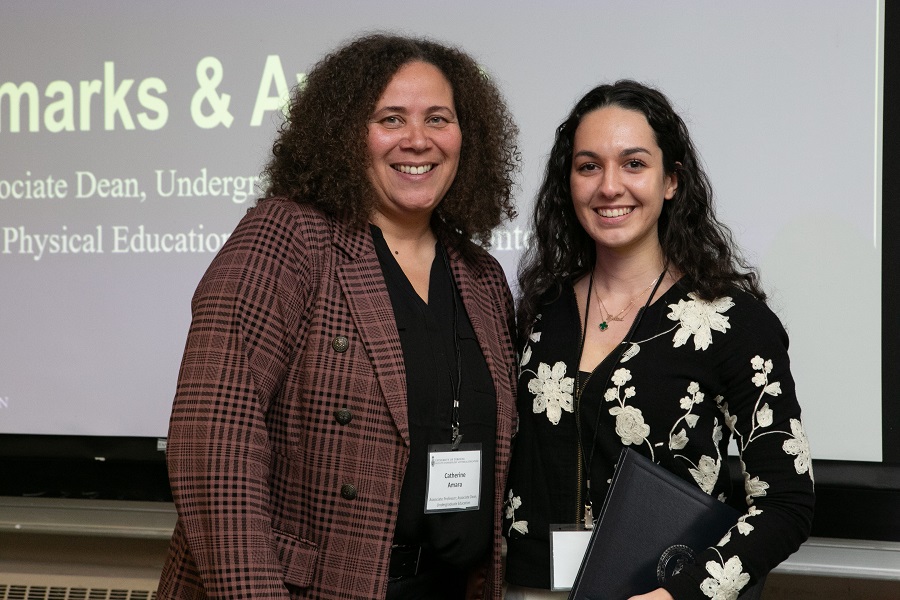
- The effects of 5-days of strict bed rest on changes in body composition, strength and physical performance in healthy older adults, presented by Arianne Zabbal from McGill University (faculty advisor: Assistant Professor Tyler Churchward-Venne)
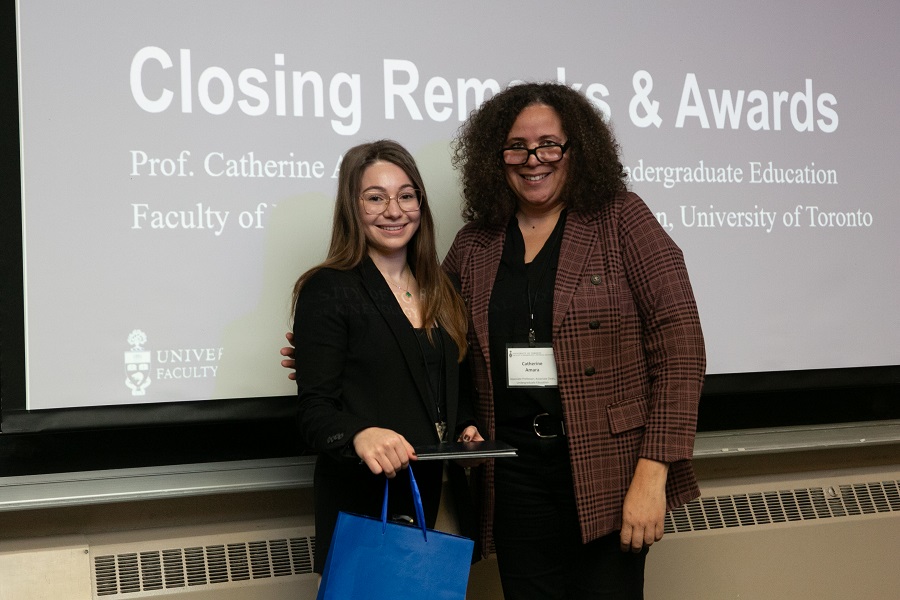
The winning presentations were recognized with an award presented by Associate Professor Catherine Amara, associate dean of undergraduate education at KPE.
